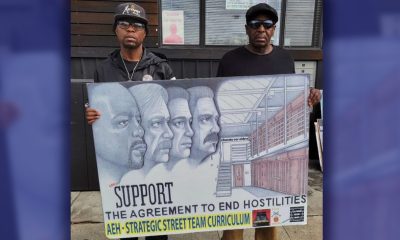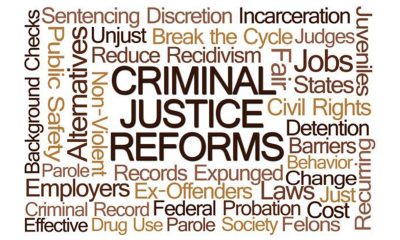National
Jail Population Overlooked in Reform Efforts

African Americans account for 25 percent of the 12 million jail admissions every year. (Wikimedia Commons)
By Freddie Allen
Senior Washington Correspondent
WASHINGTON (NNPA) – In a system that is often overlooked by the public and misused by law enforcement, Blacks account for more than one-third (36 percent) of the jail population, according to a new report from the Vera Institute of Justice, a nonpartisan research and policy group.
The report titled, “Incarceration’s Front Door: The Misuse of Jails in America,” details the practices and policies that funnel a disproportionate number of Black men and women in and out and back into jails.
In the introduction to the report, Nicholas Turner, the president and director of the Vera Institute wrote that jails are necessary for some people, but too often ordinary people are “held for minor violations minor violations such as driving with a suspended license, public intoxication, or shoplifting because they cannot afford bail as low as $500.”
The report said that roughly 75 percent of sentenced offenders and those awaiting trial in jail were there on nonviolent traffic, property, drug, or public order offenses. And while they sit, life goes on without them. Bills pile up, rent goes unpaid and hourly wage workers watch paychecks shrink or they just get fired.
Turner added: “Single parents may lose custody of their children, sole wage-earners in families, their jobs – while all of us, the taxpayers, pay for them to stay in jail.”
In everyday dialogue, people often use “jails” and “prisons” interchangeably, but these tools of the criminal justice system serve distinct purposes.
“Unlike state prisons, which almost exclusively hold people serving state sentences, jail populations are heterogeneous, making them particularly challenging to manage,” the report said.
Pretrial detainees, locally and state sentenced inmates, apprehended pretrial or sentenced inmates from other jurisdictions and Immigration and Customs Enforcement (ICE) detainees all bunk in local jails, while local jurisdictions collect fees. Sentences can range from a few hours to months for more serious offenses or overcrowding at other facilities.
But just like mass incarceration in prisons was sparked by the War on Drugs, the growth in the jail population also soared because of drug arrests.
“From 1981 until 2006, when they peaked, total drug arrests more than tripled, from 560,000 to 1.9 million, and the drug arrest rate (per 100,000) grew 160 percent,” according to the Vera report. “The share of people in jail accused or convicted of a drug crime increased sharply in the 1980s.”
Even though, state and federal prisons house more inmates, jails record about 19 times more admissions. African Americans account for 25 percent of the 12 million jail admissions every year.
“Black males, in particular, are arrested at a younger age and at higher rates than their white counterparts, often giving them a longer ‘rap’ sheet regardless of the charges or the eventual dispositions of the cases,” the report explained. “Schools in minority neighborhoods are more likely to have law enforcement officers on site and to embrace ‘zero tolerance’ policies.”
The report continued: “With arrest records on file at earlier ages, subsequent contacts with police result in more severe case outcomes as these young men come of age.”
When people suffering from mental health disorders find themselves homeless, unemployed, or on drugs they are arrested for minor crimes at higher rates than other offenders and spend time in jail where their conditions deteriorate.
“Serious mental illness, which includes bipolar disorder, schizophre¬nia, and major depression, affects an estimated 14.5 percent of men and 31 percent of women in jails – rates that are four to six times high¬er than in the general population,” the report said. “According to the [Bureau of Justice Statistics], 60 percent of jail inmates reported having had symptoms of a mental health disor¬der in the prior twelve months.”
On the inside, jailed inmates with few options pay private phone companies exorbitant fees to stay in touch with loved ones on the outside. Some jails also charge for laundry services, room and board, and medical care.
“Add to this child support payments, credit card debt, rent, and other living expenses that can accumulate during incarceration – often with late charges or compounded interested tacked on – the financial picture for many leaving jail is very bleak,” said the report. High bail amounts often contribute to that bleak financial picture and “combined with overloaded courts, a situation arises in which defendants can spend more time in jail pretrial than the longest sentence they could receive if convicted.”
The report recommended introducing debt payment plans, making basic re-entry tools available for everyone leaving jail, and problem-solving courts that address socioeconomic issues surrounding incarceration including substance abuse, mental illness and homelessness.
While some jurisdictions have made modest gains in steering individuals away from jails and curbing the length of sentences, the report said that systemic reform would take significant cooperation among all local law enforcement officials.
“The misuse of jails is neither inevitable nor irreversible,” the report said. “To both scale back and improve how jails are used in a sustainable way, localities must engage all justice system actors in collaborative study and action. Only in this way can jurisdictions hope to make the systemic changes needed to stem the tide of people entering jails and to shorten the stay for those admitted.”
Activism
Oakland Post: Week of April 24 – 30, 2024
The printed Weekly Edition of the Oakland Post: Week of April 24 – 30, 2024

To enlarge your view of this issue, use the slider, magnifying glass icon or full page icon in the lower right corner of the browser window. ![]()
Activism
Oakland Post: Week of April 17 – 23, 2024
The printed Weekly Edition of the Oakland Post: Week of April 17 – 23, 2024

To enlarge your view of this issue, use the slider, magnifying glass icon or full page icon in the lower right corner of the browser window. ![]()
Barbara Lee
Congresswoman Barbara Lee Issues Statement on Deaths of Humanitarian Aid Volunteers in Gaza
On April 2, a day after an Israeli airstrike erroneously killed seven employees of World Central Kitchen (WCK), a humanitarian organization delivering aid in the Gaza Strip, a statement was release by Rep. Barbara Lee (D-CA-12). “This is a devastating and avoidable tragedy. My prayers go to the families and loved ones of the selfless members of the World Central Kitchen team whose lives were lost,” said Lee.

By California Black Media
On April 2, a day after an Israeli airstrike erroneously killed seven employees of World Central Kitchen (WCK), a humanitarian organization delivering aid in the Gaza Strip, a statement was release by Rep. Barbara Lee (D-CA-12).
“This is a devastating and avoidable tragedy. My prayers go to the families and loved ones of the selfless members of the World Central Kitchen team whose lives were lost,” said Lee.
The same day, it was confirmed by the organization that the humanitarian aid volunteers were killed in a strike carried out by Israel Defense Forces (IDF). Prior to the incident, members of the team had been travelling in two armored vehicles marked with the WCF logo and they had been coordinating their movements with the IDF. The group had successfully delivered 10 tons of humanitarian food in a deconflicted zone when its convoy was struck.
“This is not only an attack against WCK. This is an attack on humanitarian organizations showing up in the direst situations where food is being used as a weapon of war. This is unforgivable,” said Erin Gore, chief executive officer of World Central Kitchen.
The seven victims included a U.S. citizen as well as others from Australia, Poland, the United Kingdom, Canada, and Palestine.
Lee has been a vocal advocate for a ceasefire in Gaza and has supported actions by President Joe Biden to airdrop humanitarian aid in the area.
“Far too many civilians have lost their lives as a result of Benjamin Netanyahu’s reprehensible military offensive. The U.S. must join with our allies and demand an immediate, permanent ceasefire – it’s long overdue,” Lee said.
-

 Community2 weeks ago
Community2 weeks agoFinancial Assistance Bill for Descendants of Enslaved Persons to Help Them Purchase, Own, or Maintain a Home
-

 Activism3 weeks ago
Activism3 weeks agoOakland Post: Week of April 3 – 6, 2024
-

 Business2 weeks ago
Business2 weeks agoV.P. Kamala Harris: Americans With Criminal Records Will Soon Be Eligible for SBA Loans
-

 Community2 weeks ago
Community2 weeks agoAG Bonta Says Oakland School Leaders Should Comply with State Laws to Avoid ‘Disparate Harm’ When Closing or Merging Schools
-

 Activism2 weeks ago
Activism2 weeks agoOakland Post: Week of April 10 – 16, 2024
-

 Community1 week ago
Community1 week agoOakland WNBA Player to be Inducted Into Hall of Fame
-

 Community1 week ago
Community1 week agoRichmond Nonprofit Helps Ex-Felons Get Back on Their Feet
-

 Community2 weeks ago
Community2 weeks agoThe Year Ahead: Assembly Speaker Rivas Discusses Priorities, Problems





















































